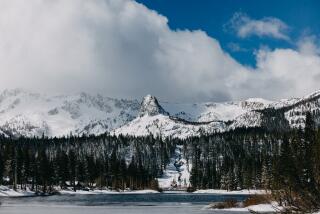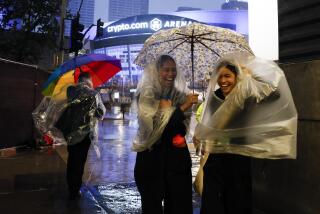February ranked among the driest on record across California. Forecasters hopeful for a ‘miracle March’
- Share via
After one of the driest Februaries on record across much of California, the first day of March brought a dash of rain and a dusting of fresh powder to the parched landscape.
The storm, which rolled into Los Angeles County on Sunday afternoon, dropped less than one-tenth of an inch of rain on the coast, while higher elevations saw between one-quarter and an inch of precipitation.
Snow Valley Mountain Resort in the San Bernardino Mountains reported a foot of snow from the system, while Frazier Park in Kern County received a 3-inch dusting, said John Dumas, a meteorologist with the National Weather Service in Oxnard.
Sunday’s rain was the most precipitation some areas have seen in at least a month. A high-pressure ridge that’s lingered over the eastern Pacific Ocean for much of January and February has rerouted winter storms that typically soak California to the Pacific Northwest.
That pattern appears to be shifting, which could allow more storms through, but it’s unclear how long it will last. Long-range models are hinting at more rain in Southern California on Saturday or Sunday and a larger storm by the middle of next week, Dumas said.
Forecasters and water managers keeping a close eye on precipitation are hopeful that a wet month, a phenomenon known by weather experts as “miracle March,” may help bolster lackluster winter rain totals.
“It won’t take much to beat February,” Dumas said.
After a parched January across southwestern California, February did not bring the reprieve forecasters had wanted. Most places received less than 5% of normal rainfall for the month, according to weather service data.
This lack of precipitation rewrote the record books in some areas in California.
Santa Maria Airport, which did not see any rain last month, and San Luis Obispo Airport, which saw just a trace, had their driest Februaries on record. Los Angeles International Airport and Paso Robles Airport both received a trace of precipitation, tying with their driest Februaries on record. Records for both locations date back more than 70 years.
A total of 0.04 inches of rain fell in Downtown Los Angeles last month, placing it in a tie with February 1899 for the 10th-driest February on record. There has been no rain downtown three times in the entire month of February —1912, 1933 and 1984 — i since records began in 1877. In February 1885, 1896, 1900 and 1964, just a trace of rain was recorded.
Downtown Los Angeles also had its fourth-driest combined January and February on record after just 0.36 inches fell during the first two months of this year. The driest combined January and February occurred in 1912, when a scant 0.07 inches of rain fell in downtown.
Much of Northern California also experienced a bone-dry February.
Santa Rosa, San Francisco Airport, Redwood City, Oakland and San Jose did not see any rain last month, making it their driest February on record. The previous February record for those locations was set in 1953, data shows.
The lack of rain has pushed nearly 70% of the state, including much of the Central Coast and Los Angeles County, into abnormally dry conditions. About 23% of the state, including large swaths of the San Joaquin Valley and portions of the Sierra Nevada, home to about 5.9 million people, is considered to be in moderate drought conditions, according to maps released last week by the U.S. Drought Monitor.
The lack of rain also has taken its toll on the Sierra Nevada snowpack, a key source of the state’s water supply. As of Thursday, the statewide snowpack measured 46% of average for the time of year. At roughly the same time last year, the snowpack measured 151% of average.
More to Read
Sign up for Essential California
The most important California stories and recommendations in your inbox every morning.
You may occasionally receive promotional content from the Los Angeles Times.














